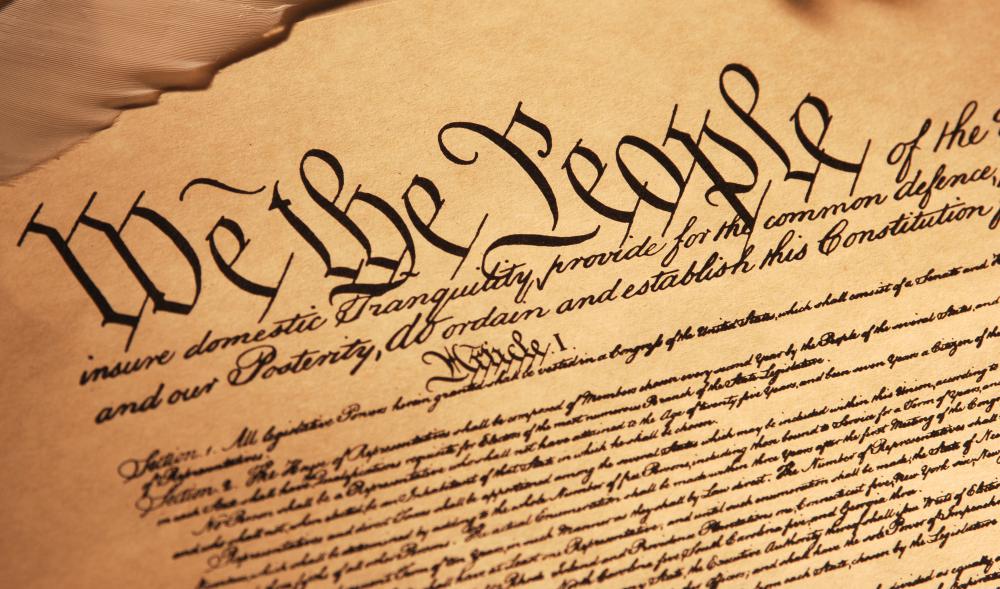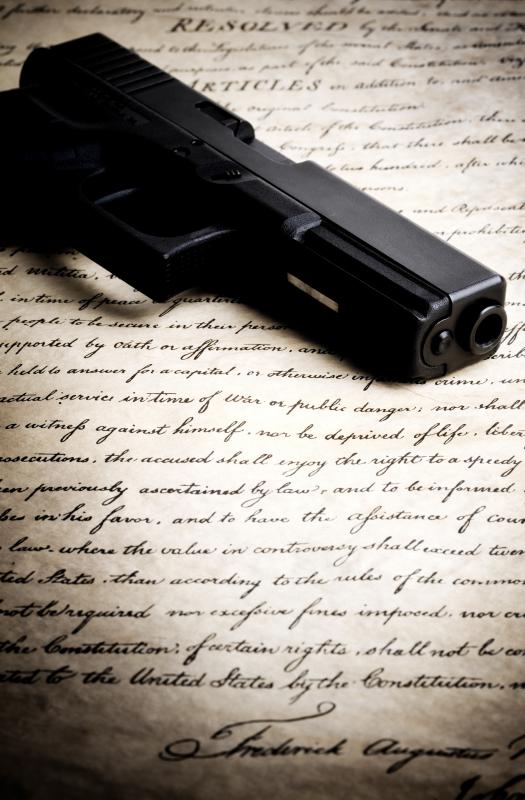At WiseGEEK, we're committed to delivering accurate, trustworthy information. Our expert-authored content is rigorously fact-checked and sourced from credible authorities. Discover how we uphold the highest standards in providing you with reliable knowledge.
What are Civil Liberties?
In the 13th century an important document guaranteeing certain rights to citizens was created in England. The Magna Carta was a statement about people’s civil liberties, guaranteeing certain types of treatment for people and limiting the government’s power to act without reason. By definition, civil liberties are basic freedoms granted to a country’s citizens, usually defined by law and evidenced in government documentation. People need not earn these; citizenship automatically confers them in most cases. Documents like the Magna Carta make explicit this idea and are often viewed as the inspiration for the way later governments would define and limit their powers toward their citizenry.
For Americans, familiarity is greatest with US Constitution. In the Bill of Rights, the first ten amendments of the Constitution, the United States grants people certain civil liberties. Most know at least some of them. People can speak freely, assemble any time they’d like, practice the religion of their choice, carry a weapon, and write what they choose, to name just a few.

Other countries grant similar rights to citizens. France, like America, has civil liberties like freedom of the press and freedom of speech. India has laws protecting some citizens, particularly children against certain forms of exploitative practices. Each country may define types of civil liberties differently, and might at times be more or less likely to actually protect the rights its government documents presumably grant. This is not only true in states that have more limited liberties and a reputation for curtailing them, but also true in some that are celebrated for their permissive stance toward citizenry most of the time.

One of the things that is of issue in many countries is exactly how many civil liberties should be granted and whether any present rights should be removed. In the US there are still arguments over the Second Amendment, which provides the right to bear arms. Those in opposition argue that this right makes no sense in present day context and risks the basic freedoms, like right to live, of other people. Just as passionately, folks may cling to this right, claiming that it is one of their civil liberties and they wish to exercise it, perhaps for self-protection or other reasons.

In many countries, there are people who argue for greater freedoms to be accorded. America continues to fight a battle over who has rights to marry, limiting this freedom to heterosexual couples in most states. Similarly, in more restrictive countries, some people risk their lives to earn basic civil liberties like free speech, peaceful protest, or freedom of assembly.

Ultimately, what exactly constitutes a civil liberty may depend on the country a person calls home. While countries are likely to have fairly similar rights granted, there can be small differences. These differences may or may not be highly significant from a civil liberty’s perspective, enhancing or reducing the freedom of a country’s citizens.
AS FEATURED ON:
AS FEATURED ON:
















Discussion Comments
Sunny27- I am tired of all of these civil liberties groups like the American Civil Liberties Union that want to protect terrorists under the guise of civil liberties.
The American Civil Liberties Union is totally against the Patriot Act. The Patriot Act is an intelligence gathering measure that protects Americans from terrorists.
Our government needs to protect us not worry so much about how the terrorist feel about things or how the rest of the world views our conduct. We have to protect our national interest which includes protecting Americans at all costs.
If an intercepted wire taping resulted in a thwarted terrorist attempt then we saved some lives in the process.
If water boarding allows us to gain intelligence that allows us to save innocent people then that it what we have to do.
Organizations like the American Civil Liberties Union want to treat terrorists with kid gloves which has to stop because we should all be on the side of America after all American is in their title.
GreenWeaver-I could not agree more. We have to examine our national security vs. these civil liberties arguments.
Terrorists are getting away with murder because we want to make sure that they are given these civil liberties. The civil liberties definition includes being an American citizen which these terrorist clearly are not.
I think that it is insulting to the people of New York and to the American people in general to treat these terrorists they way that they do.
They should all be given military tribunals that have different rules and a lower standard of evidence.
In addition, a military tribunal is not publicized like a federal court case is and sensitive data and aspects of our intelligence and national security does not have to be disclosed as it does it federal court.
This is really a disgrace and why American civil liberties applies to Americans and not terrorists.
It is important to note the difference between civil rights and civil liberties. Civil rights revolve around the notion that a person cannot be discriminated against based on race, national origin, religion or sex.
Civil liberties are the rights at are afford to all American citizens such as freedom of speech and the right to a speedy trial with an appointment of counsel if you do not have a lawyer.
This is really important because in the recent trial of Ghalani a member of Al Qaeda that was accused of bombing two United States embassies in Africa that killed 224 people was found not guilty.
What is insane about this case is that an enemy combatant which is what a terrorist is classified as could be given civil liberties that should only be given to American citizens.
The problem with trying this terrorist in federal court in the United States like they did is that the terrorist is treated like all other defendants and the rules of evidence are very different in federal court than in a military tribunal.
A lot of relevant evidence was suppressed which is why the verdict occurred the way it did. Had Ghalani been tried in a military tribunal the results would have been completely different.
Post your comments